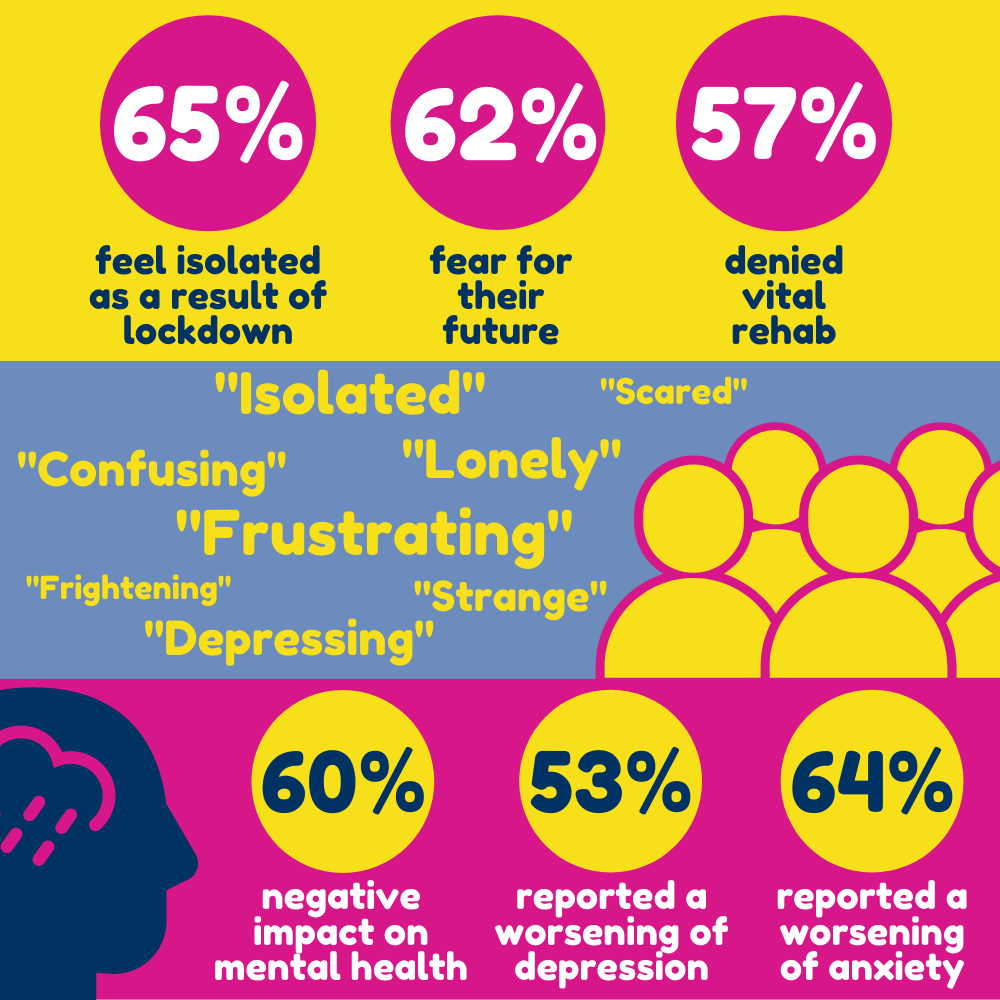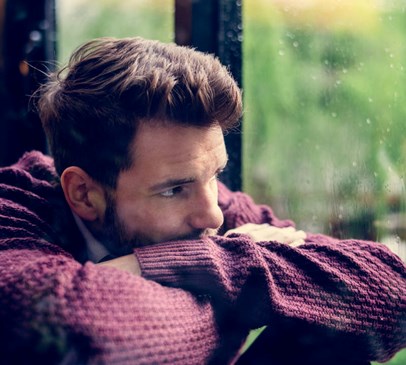Early rehabilitation following brain injury can be crucial in helping survivors to regain a degree of independence and relearn lost skills, including walking and talking. But 57% of those who sustained their injuries within the past two years say their access to specialist treatment has been negatively impacted.

A further 64% of those living with the long-term effects of brain injury reported a deterioration in their mental health as a result of the measures implemented to control the spread of COVID-19, while almost two thirds say they now fear for their futures.
The key findings revealed:
- 57% of people who sustained a brain injury within the past two years reported that their rehabilitation has been negatively impacted
- Two thirds of respondents reported a negative impact on their psychological wellbeing
- 62% respondents fear for their future
- 50% have lost access to vital support that helps them to cope
- 42% say their rehabilitation has been negatively impacted
Download the full report: The impact of lockdown on brain injury survivors and their families.
Headway says that the stark findings highlight the importance of ensuring those affected by brain injury are provided with appropriate physical, psychological and social rehabilitation and support.
Peter McCabe, Chief Executive of Headway, said: “The results of this study are deeply concerning. The first two years following a brain injury are very important in terms of a patient’s long-term prognosis and any delay to receiving specialist rehabilitation can impact their ability to lead an independent life in the future.
“Of equal concern is the short-term impact of the lockdown on survivors and their families.
“The effects of brain injury, such as problems with memory, a lack of insight or difficulties controlling behaviour and emotions, can mean that survivors face significant challenges in understanding and coping with the necessary safeguards put in place to deal with the pandemic.
“This can lead to conflict with other members of public as a result of not remembering the rules around social distancing, or excess pressure and emotional toil being placed on carers and family members.
“Local Headway groups and branches across the UK are going to extraordinary lengths to ensure help remains available to vulnerable individuals and families during the lockdown. Without this help, the figures reported in our study would no doubt have been much worse.
“However, with local authorities under increasing financial pressure, local charities are facing an uphill battle to survive, exacerbating survivors’ fears for the future.
“Unless the government provides local authorities with adequate funding for community-based rehabilitation services, thousands of brain injury survivors and carers will either be left without support or be forced to rely on more costly state-funded care.”
'I can’t bear to imagine a world without Headway'
 For the past five years, 52-year-old Jane Hallard from Gloucester has relied on her local Headway group to help her rebuild her life following a subarachnoid haemorrhage in 2015.
For the past five years, 52-year-old Jane Hallard from Gloucester has relied on her local Headway group to help her rebuild her life following a subarachnoid haemorrhage in 2015.
Jane was helping her son to clean his car when she felt like her head had been hit with a “sledge-hammer”. After collapsing, Jane was rushed to hospital where she underwent life-saving surgery before spending the next eight weeks in hospital.
The resultant brain injury changed every aspect of her life, leaving her with chronic cognitive fatigue and mental health challenges. It also led to the collapse of her marriage.
“Without the support of my local Headway I wouldn’t be able to get through each week,” said Jane. “In fact, without their support, I wouldn’t be here at all.
“COVID-19 has exacerbated my feelings of anxiety and I have struggled to cope with the changes to my routine, but Headway has always been there when I needed them, and their support has been crucial over the past 12 weeks.
“I can’t bear to imagine a world without Headway in it and I really fear for my future if I can no longer access their specialist support.”
‘Adult social care must be protected’
Many of the specialist rehabilitation and support services that Headway groups and branches provide are commissioned by local authorities.
Following the outbreak of the pandemic, only 4% of Directors of Adult Social Care from councils across England are confident that their budgets in 2020/21 are sufficient to meet statutory duties, according to a recent report by the Association of Directors of Adult Social Services (ADASS).
ADASS has called on the Government to commit to a two-year ring-fenced funding settlement be provided to local authorities to fund adult social care. This is a recommendation that has received the support of Headway.
The charity is also concerned by recent studies published in The Lancet Psychiatry suggesting COVID-19 could lead to an increase in the number of patients sustaining acquired brain injuries. Any such increase would put further pressure on Headway’s ability to support those affected at a time when the charity is under such financial pressure.
Peter continues: “Funding for adult social care cannot be compromised and must be protected.
“If local authorities are not provided with the resources required to fund specialist rehabilitation and support for vulnerable families, the impact on society will be catastrophic.”Back










